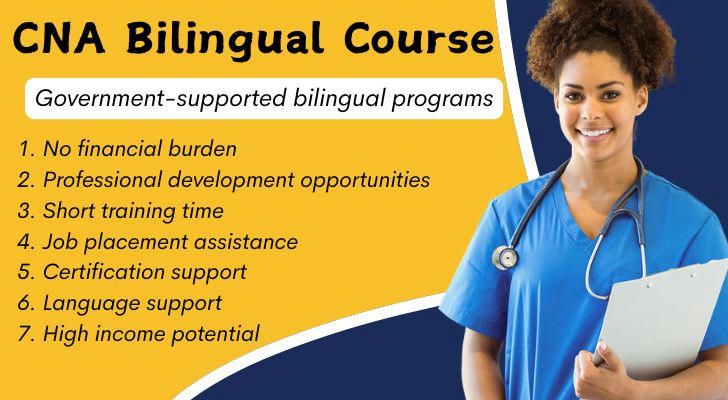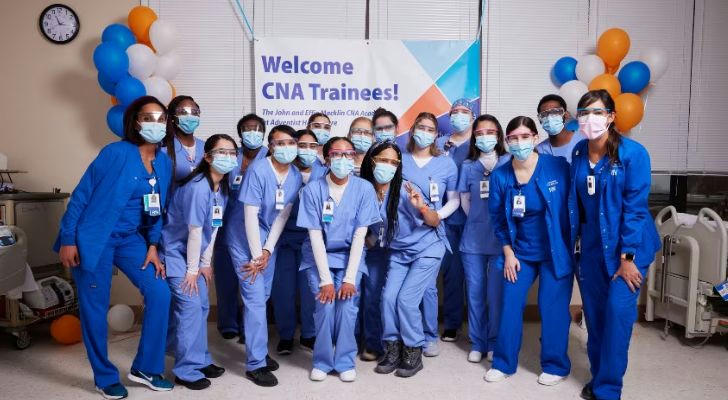Start a stable career in healthcare with government-supported bilingual CNA training.
Do you want to start a rewarding career in healthcare without spending years studying or investing a fortune? Government-supported Certified Nursing Assistant (CNA) programs offer rapid training, no advanced education required, no financial burden, fast certification, and employment support. These programs are ideal for newcomers who are changing careers, raising a family, or planning for future immigration. Many programs now offer bilingual instruction, making it easier for non-native English speakers to get started.

What CNA Training Can Offer You
- Short training time: Most programs are completed in 4 to 12 weeks.
- Earning potential: Entry-level positions typically pay between $17 and $23 per hour.
- Career ladder: Easily transition to positions such as LPN or RN.
- Job placement assistance: Many programs partner with clinics or hospitals.
- Language support: Bilingual options remove barriers for non-native English speakers.
CNA programs provide hands-on training in patient care, safety, communication and ethics – skills that are immediately applicable in a hospital, nursing home or home health care setting.
Why CNA programs attract so many students
Whether you’re a recent high school graduate who’s not sure what to do next, a working adult ready for a career change, or someone balancing family life, CNA training can provide you with a practical and low-cost path into health care.
Common obstacles faced by CNA students:
| Group | Challenge | What Helps |
|---|---|---|
| High school grads | Fear of choosing the wrong path | Short-term programs reduce risk and cost |
| Career changers | Job burnout or income instability | Healthcare offers reliable pay and clear roles |
| Budget-conscious | Long, expensive RN programs | CNA offers lower cost, faster entry |
| Family caregivers | Can’t commit to full-time school | Part-time, evening, or online options |
| International aspirants | Need verifiable skills for immigration | CNA certification adds points and employability |

Where to Find Government-Supported Bilingual CNA Programs
Some institutions offer CNA training that is supported by public supporting or workforce development programs. These programs can lower out-of-pocket costs, provide support for certification, and provide support for learners whose first language is not English.
1. Minnesota International Academy – St. Paul, Minnesota
- Cost: Government support, no financial burden
- Course Format: Hybrid (3 days of face-to-face courses, 1-2 days of online courses)
- Language Support: Bilingual courses available, including courses tailored for English learners
- Additional Benefits: Employment assistance, financial guidance, and flexible schedules
2. Lehman College – Bronx, NY
- Cost: Government-supported (cost varies; please check current availability)
- Training Format: ESL and CNA training, a combination of online and in-person
- Language Support: Combines CNA certification with contextualized English
- Additional Benefits: Workforce development support, job placement assistance
3. San Diego Continuing Education Institute - San Diego, CA
- Cost: Government support, no financial burden
- Course Format: Bilingual instruction at designated locations
- Language Support: ESL and CNA training, including tailored courses for English learners
- Additional Services: Job preparation, resume development, and clinical internships
Designed for working professionals, parents, and those new to health care, these programs emphasize real-world learning and community-centered supports.
2025, CNA career opens a brilliant chapter
With the intensification of the aging population trend and the increasing demand for basic nursing staff in the medical system, the social value and employment prospects of healthcare workers are becoming increasingly prominent. As the most direct and cost-effective way to enter the medical field, the Certified Nursing Assistant (CNA) certification has become the first choice for more and more people to start their career transformation and skills improvement. Whether it is a young person who has just graduated, a job seeker who hopes to have a stable job, or a caregiver who plans to return to the workplace, this certification provides a reliable channel to a stable and high-demand industry.
It is particularly worth mentioning that many CNA programs now have strong support from the government, which not only greatly reduces the financial burden, but also provides flexible learning arrangements. At the same time, the promotion of bilingual teaching has also broken down the language barrier, allowing non-native English speakers to complete professional training in a comfortable and confident learning environment.
Next Steps:
- Look for workforce development programs in your area
- Search terms like “CNA programs near me with language support”
- Reach out to local colleges or immigrant support organizations
Invest in a future where your work truly matters—CNA training can be your first step.
